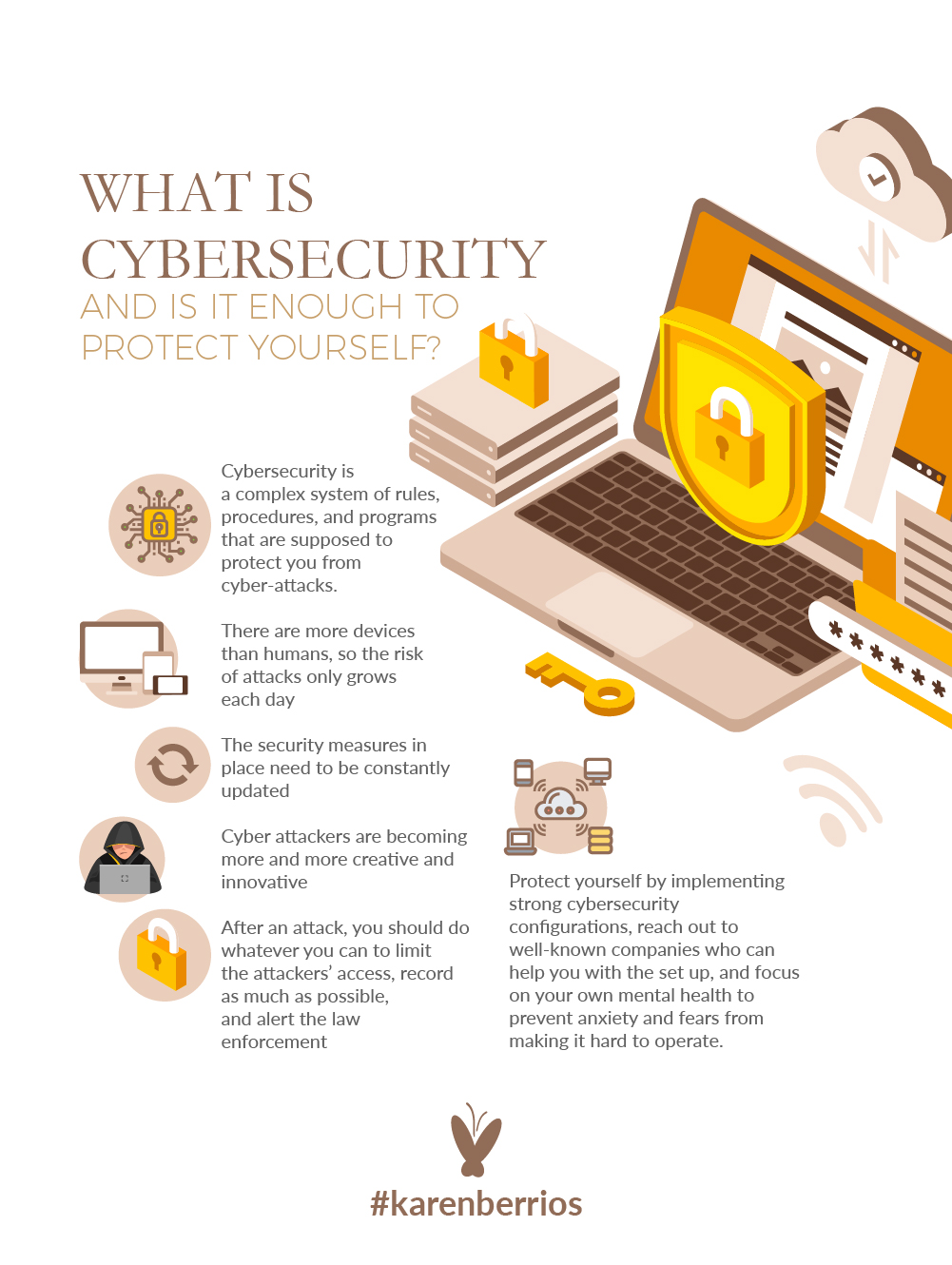

What is Cybersecurity And is it Enough to Protect Yourself?
Cybersecurity. When you’ve been a victim of a cyberbullying attack, you’re left with emotional and psychological trauma that can sometimes have long-term consequences. And it’s not just celebrities and big companies that get hacked these days, it seems like whoever is behind these cyber threats and attacks doesn’t always seem to hit the financial aspect – sometimes it’s more about the threats and scares that keep them coming back from more.
And what can you do when these cyber attacks happen? Are there some security measures you can rely on? Is there a procedure you can follow to ensure it won’t happen again? And is there an official cybersecurity support system that will help you go through this?
You are more vulnerable than you think, and you might be surprised as to how little is out there that can help you protect yourself from cyber attacks and data breaches that can bring on long-lasting trauma and serious consequences.
What is Cybersecurity?
Let’s start with what cybersecurity is in the first place. Officially, cybersecurity is defined as the “practice of protecting systems, networks, and programs from digital attacks,” and it works through a multi-layered approach to create an effective defense against cyber attacks.
When you do a short online search, it seems like everyone is saying the same thing and how a strong cybersecurity strategy can only be implemented if everyone is involved, from the individual to anyone who has access to your data or network security settings. Still, this isn’t as black and white as it sounds.
Types of Cyber Protection?
There are many different cyber protection types, but all of them need to work in an ecosystem that will function without hiccups, as that will ensure its efficacy. The known types of cyber protection include:
- Network security – set of rules, policies, and powerful configurations that are designed to protect the integrity, confidentiality, and accessibility of your computer network and data. Most times, it’s formed by using both software and hardware technologies and it involves everything from a network security key (password) to firewall and antivirus software.
- Operational security – a security and risk management process that helps determine whether or not sensitive information is being divulged to the right hands.
- Application security – security rules, policies, and configurations within applications to prevent data breaches and data leaks, especially in the form of private and sensitive information.
- Cloud security -set of rules, policies, and configurations when it comes to data that’s stored in your cloud as well as control over who has access to it.
- Information or data security – a variety of tools and processes someone has to protect information or data. It can be instilled by the company or by individuals.
- Disaster recovery/business continuity planning – strategies and procedures in place on how to respond to or adapt to cyber threats as well as any other unforeseen disruptive events while at the same time minimizing negative impacts and consequences.
- Critical infrastructure security – cyber and physical systems, tools, rules, and assets that are crucial to the United States and their incapacity or destruction might result in serious threats and damage to overall physical and economic security, public health, or public safety.
- Physical security – literal physical protection of servers, building sites, and all equipment used in establishing a network.
- End-user education – resources, skills, and tools individuals can learn and equip themselves with to know more about how overall cybersecurity functions and what is their role in protecting themselves.
What Can You Actually Do After a Cyber Attack?
Now, all of these cybersecurity systems in place sound well-organized and on top of all potential threats and sensitive data breaches. And yet, once you become a victim of a cybersecurity attack where someone gets access to your information, steals data, impersonates you, or even only harasses you, there isn’t much you can find about what steps to take.
After Karen’s unfortunate cyber attack situation, she began to dive into deep research to find ways to support and protect herself as well as help others who might be going through the same thing. Even if none of your data is stolen and you still have access to all of your private information, just the mere fact that someone managed to breach through your cyber security can leave long-term trauma and anxiety, fearing it will happen again.
After a cyber attack happens, you’re basically left to your own devices to control the damage and try to limit their access as much as possible. You’re also encouraged to record any activity you might catch and then report it to the authorities. And that’s about it. It’s safe to say that this isn’t the least satisfying to those who have seriously been damaged by cyberbullying attacks. Not only is there important and sensitive information that could have been stolen, manipulated, or threatened, but it can lead to fears for one’s own life and the extent these attacks can go to, transitioning from digital to physical.
Just imagine someone hacks into your personal calendar. They know where you’ll be at any given moment, giving them the opportunity to track your movements and potentially threaten or harm you in person. And simply reporting it to law enforcement won’t protect you from “what if something happens sometime”.
After you’ve assessed the damage, the only thing you can do is regroup and go back to developing a good cybersecurity system, potentially hiring a professional to help you and close off any weak links. And this is also something you need to seek out yourself, as there isn’t really an official way to go about this. You’re basically left to do your own research and find someone to help you protect your network, data, computer systems, and even mobile devices you use on a daily basis.
So, what can you actually do after a cyber attack? Everything and anything possible that can help you feel better protected and safer. Unfortunately, how that will happen will be more on you, getting more equipped with endpoint security and the actions you can do from your end, researching the best cybersecurity companies that can help you set up your network, and working on your own mental health so you can go on with your life and stop jumping every time the phone rings or the alarm goes off.
Final Thoughts
Cybersecurity isn’t as powerful as we think, and with more devices than people nowadays, the attackers are getting innovative and creative. This means you have to be more vigilant, stay constantly updated on the newest security protocols and common cyber threats, and be more conscious about what type of data you’re allowing to be online.

hey there
I'm Karen!
I have found my cancer journey to be a positive and profound transformational experience. I’m inspired to share my healing journey here, and trust you’ll find hope, encouragement and purpose as you discover the healing power that lies within you.
Join
The Mailing List!
By signing up for my newsletter, you agree with our Privacy Policy and Terms & Conditions.



